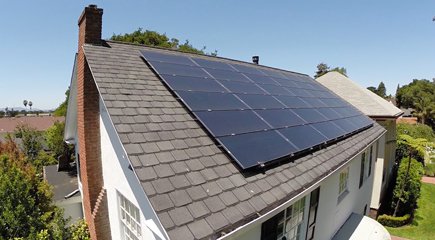Making Sense of Solar

Most solar panels are designed to only lose 1 percent efficiency each year. Photo: Sungevity (2016)
Today, many homeowners are considering the benefits of going solar because of energy savings and tax credits. Systems are also getting more affordable. I asked Sungevity’s Sloane Morgan to answer some of the most common questions.
Is it expensive to install solar?
When residential solar systems were first introduced, they were expensive for the average homeowner, but solar panel prices have dropped radically since then—today, they’re 100 times cheaper than they were in the 1970s (Source: cleantechnica.com/2014/09/04/solar-panel-cost-trends-10-charts). In many areas, homeowners with solar systems are paying the same or less for solar electricity than for regular electricity from the grid.
Imagine if you had a chance to buy 20 years’ worth of gasoline at 1995 prices. Would you do it? That’s a great way to start thinking about solar. We’re helping people produce a certain amount of power at a locked-in rate for 20 years or more.
Should I buy or lease a system?
You actually have more options in most cases. You can buy a solar system outright, finance it with a loan, lease it for 20 years or “pay as you go” with a power purchase agreement. A reputable solar company will show you all of your choices, taking into account what makes the most sense for your family and financial situation.
Are warranties the same for leased and purchased systems?
Yes, many solar companies offer 20-year warranties for purchased systems, which is the same length as the warranty offered with a standard lease.
How long will my solar system last?
A long time! Our solar systems are guaranteed to produce electricity for 20 years, and they’ll likely keep producing power for longer than that. Most solar panels lose approximately 1 percent operating efficiency each year, so after 20 years, they’re still producing no less than 80 percent of what they did in the first place. (Source: www.engineering.com/ElectronicsDesign/ElectronicsDesignArticles/ArticleID/7475)
If my solar panels supply my power, what happens when it’s a cloudy day?
When you’re using more electricity than your system is generating, like on a cloudy day, your system’s bi-directional meter will pull power from the utility grid. On the flip side, when you’re generating more electricity than you’re using, you’re pushing power onto the utility grid.
How much money will I save on energy with a solar system?
The best answer is, “It depends.” The exact amount depends on numerous factors, including the location of your home, the size and angle of your solar system, and your electricity consumption. Another major factor is the price your utility company will charge for power in the future. Since nobody knows exactly what the utility companies will do, we look at historical energy prices to estimate price fluctuations¬ going forward. We know exactly what you’ll pay for solar, so we can compare those utility estimates to what you’ll pay for solar and estimate your likely savings from there.
What happens to my solar lease if I sell my home?
We’ve helped hundreds of homeowners sell their solar homes, so we have the process down. With a little bit of advance notice, we can work with you to decide what type of transfer would work best for you and your potential buyer.
Many of our customers consider their options and say, “I don’t even want the potential buyer to have to run credit. What if I pre-pay my lease and that amount becomes part of the closing of the home?” In that scenario, you would turn over a prepaid solar lease to the homebuyer. Sungevity still owns, insures and maintains the system, but the homebuyer doesn’t have a monthly payment.
You can also transfer the entire solar agreement to the buyer. The buyer does have to qualify for credit in this case, but typically, the credit score required for a solar agreement is similar to what’s required for a mortgage. Then, the buyer takes over the monthly solar payment and gets to enjoy all the benefits of solar.
Use Diamond Certified Resource to find top rated companies.
Local, Top Rated Diamond Certified Companies Related to Your Topic
Marin County Solar Companies
San Francisco Solar Companies
Sonoma County Solar Companies
San Mateo County Solar Companies
Alameda County Solar Companies
Related Articles
The Homeowner's Guide to Solar
Get Expert Advice From Owners of Top Rated Local Companies
Become a Diamond Certified Preferred Member (Always Free)
Find Top Rated Companies in the San Francisco Bay Area